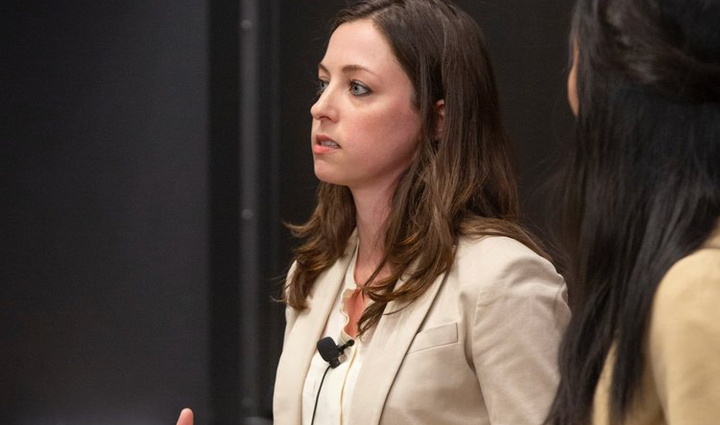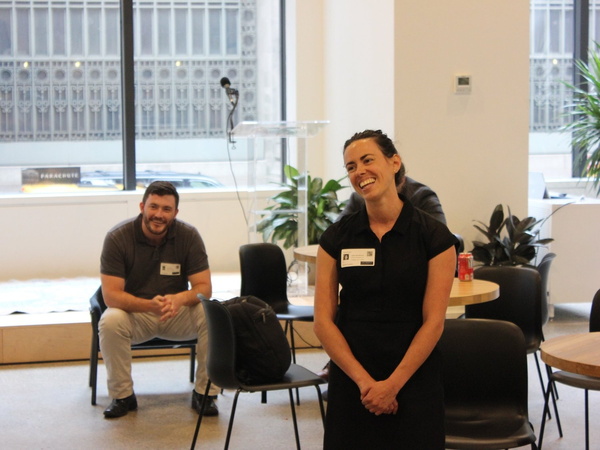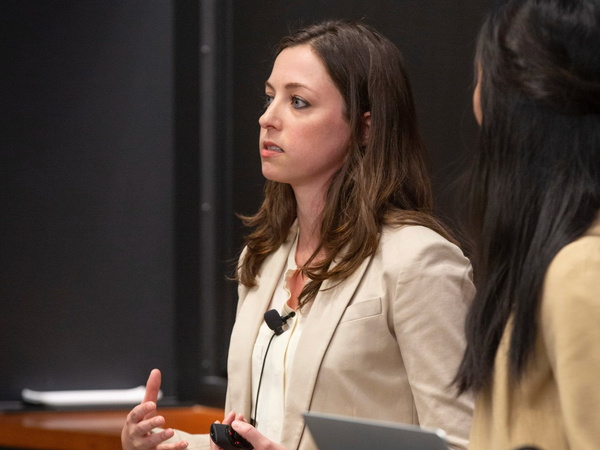Building a More Sustainable Lifestyle: Catching up with Two Summer Fellowship Teams
This summer, ten teams are spending eight intensive weeks with Tsai CITY, working on their ventures and projects as part of the 2019 Summer Fellowship. We’ll be following along as the teams sprint through the program, sharing their goals and experiences.

This week, we’re taking a look at two teams that are rethinking food and retail offerings with an eye toward sustainability.
Brazen Eats

Brazen Eats, which aims to help meat eaters reduce their meat consumption by providing tasty, convenient, and affordable plant-based eats, is rooted in two interests its co-founders share: the environment and delicious food. Last summer, co-founder Sarah Mandlebaum was eating at her favorite Chinese restaurant in Cambridge, Massachusetts, when she bit into a dumpling and had an idea: this could be a great application of an emerging category in food — plant-based meat.
She’d learned about plant-based meat in her previous role as an environmental consultant, where she worked with Impossible Foods as a client. In many ways, plant-based meat brought together elements that had shaped her career path. “I have a background in public health, both in nutrition and in environmental health,” she says. “Thinking about food from both a health perspective and a sustainability perspective, there’s actually quite a nice alignment there. In both regards, it’s better to shift our diets to include more plants and fewer animal products.”
As she thought more about her dumpling idea, she realized it could address a key gap in the market: while raw “meat” products like a hamburger patty or a sausage are available in grocery stores, there aren’t currently many options for fully prepared snacks or meals that incorporate plant-based meat products. In the fall, she went on a rock climbing trip that included Georgia Sills, her classmate at SOM and a fellow home cook. Mandlebaum pitched her idea to Sills, who was enthusiastic about working on it with her. As the fall semester continued, they started gathering business advice from faculty and — most importantly — testing things out in the kitchen.
Seeking to find their way to a tasty dumpling that could make a strong first product, they experimented with different recipes and plant-based meat products. Their first attempt involved modifying an existing beef dumpling recipe, using a plant-based burger patty. “It was gross,” laughs Mandlebaum. From there, they iterated rapidly, using feedback from fellow students, Yale staff, and event attendees to refine their product. “We had a goal of getting samples to people at least once a week,” Mandlebaum explains. Along the way, they figured out key factors like the dumpling’s texture, which had initially proved challenging, and connected with a co-packer that manufactures and packages Chinese food in New York. “They tasted them and really inspected them,” says Mandlebaum of this meeting. “They were surprised — like, ‘Oh, this is actually good!’”
For Mandlebaum and Sills, being accepted to the Tsai CITY Summer Fellowship felt like a validation of the work they’d been doing over the school year, refining their product, positioning, and business model. Over the school year, they’d unsuccessfully applied to other programs and prizes, gathering feedback and incorporating this feedback into each new iteration of their work. Arriving at the Summer Fellowship, they felt they had “done the background work to understand our customer, figure out the market,” says Mandlebaum. This summer, they’ve been working on developing their brand identity, aiming to build something that deeply resonates with customers, as well as exploring potential new products like empanadas. They have also focused on getting on grocery store shelves — after a successful initial sales meeting at New Haven’s Elm City Market, for example, they’re aiming to have their dumplings available there soon. “Our top priority was getting our product in a grocery store, on shelves, so that we can actually start selling and talking to customers in a real setting,” says Mandlebaum. As they look ahead, they’re hoping to continue this, connecting with customers around convenient food that’s good for the environment and tastes good, too.
Hand Me Up

Hand Me Up is a marketplace for children’s secondhand clothing that scales informal exchange networks like hand-me-downs, encouraging a circular economic model. For founder Melissa Mazzeo, the world of secondhand children’s clothing is very familiar: her mom has run Merry Go Rounds, a children’s consignment shop in Mazzeo’s hometown of Easton, Massachusetts, for 20 years, and Mazzeo grew up working there. “This is something that’s been in my life for a really long time, both from working at the shop and on a personal level,” she says. “I’ve always shopped secondhand for myself.” In recent years, she’s been struck by the broader role that resale shopping can play in reducing the environmental impact of the apparel industry, which currently generates huge amounts of waste. “I realized there was a real need to change people’s perceptions and behaviors around shopping for secondhand clothing, and I realized that was something I could focus on by changing the model — making shopping easier, more fun, more exciting.”
After realizing that developing her business expertise would help her build on this concept, she applied to the Yale School of Management. Once she started at SOM, she added a second degree at the School of Forestry and Environmental Studies, seeking complementary knowledge on the environmental impact side of secondhand apparel. While at Yale, she’s made use of the campus’ ecosystem for entrepreneurship, drawing from different resources as she’s refined her ideas for Hand Me Up. In her first year at Yale, she participated in a design challenge case competition with classmates and joined Tsai CITY’s Accelerator program; this past year, her experiences include taking the Startup Founders Practicum course at SOM and winning the audience choice award at the Yale Center for Business and the Environment’s Sabin Prize pitch-off, part of Startup Yale.
Now, she’s working on growing the Hand Me Up concept across three channels: the brick-and-mortar store in Easton, an online shop, and a subscription box product. This summer, she’s been working with her mom and sister to expand into a second location, an unexpected opportunity that presented itself near the start of the Summer Fellowship. “I’m envisioning it as a chance to test a lot of the assumptions that I’ve been making,” she says, explaining that she plans to try things like having a sample subscription box in-store and gathering customer feedback on how they might use this service. The experience has also given her a reminder of the “more down-to-earth, granular, detail-oriented” aspects of running a real-life business: “I’ve spent a lot of time scrubbing shelves,” she says with a laugh.
For Mazzeo, the summer has offered a chance to test out balancing this day-to-day reality with the bigger vision she has for Hand Me Up. “I want to be a voice in the circular economy movement and the resale industry. The two aren’t talking to each other that much, but they should be, because they’re really related,” she notes. She hopes that by building Hand Me Up into a successful, sustainable business, she can provide a model of this intersection. The fellowship has allowed her to test out what this would look like as a full-time role, which she hopes to pursue after graduation. “I wanted to see what that would look like — I feel like I’m actually running a business, which is both exciting and terrifying,” she says, adding that the fellowship’s community has been a key source of inspiration and support. “I’ve really loved getting to know other entrepreneurs and being in a group of people who have that shared experience.” From her Summer Fellowship cohort-mates and the classmates who’ve worked on Hand Me Up with her to her mom and sister, with whom she’s building out the business in Easton, she’s grateful for the community that has grown around Hand Me Up. “That shared understanding and support system,” she says, “have been really valuable.”
Want to hear these teams pitch live? Join us for Demo Day 2019 on July 25!